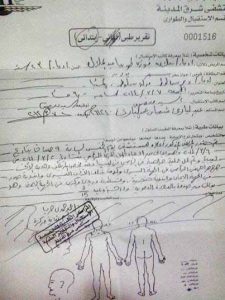ISTANBUL, Turkey (Morning Star News) – The family of an Egyptian Christian shot in Libya on March 2 says he remains close to death in a hospital in Egypt.
The shooting of Salama Fawzy Tobia, 23, in Benghazi, Libya came a week after suspected Islamic extremists killed seven other Egyptian Christians in the Libyan capital. Tobia remained in intensive care today in El Raey El Saleh Hospital in Samalut, Minya Province with a bullet wound to his head, barely holding on to life, relatives told Morning Star News.
On Saturday (March 8) his family decided to move him from a hospital in Alexandria to the hospital closer to home so he could spend the last moments of his life surrounded by loved ones, they said. Tobia suffered extensive brain damage and his family said the prognosis was grim. They have asked for Christians around the world to pray for him.
“I pray for God’s will to be done,” Tobia’s older brother, Karam Fawzy Tobia, told Morning Star News. “If He wants him to live on Earth, we will be happy. If it is His will to take him to heaven, we will accept this.”
Gunmen attacked Tobia at a produce stall in Benghazi. According to human rights activists, an unknown number of gunmen approached him and shot him at least once in the head while he was unloading fruits and vegetables. Tobia was taken from the scene to a hospital in Benghazi, where doctors treated him. Soon after his arrival at the hospital, numerous news outlets began reporting erroneously that he had died in the hospital’s intensive care unit.
The shooting was just the beginning of the ordeal for Tobia and his family. When they found out that he had been shot but was still alive, they wanted him moved to a hospital in Egypt so he could be treated in his own country. They appealed to the Egyptian government to transport him back to Egypt, but the request was denied, Tobia said.
“We requested a plane from the government to transport him to Egypt, but they didn’t do anything,” he said. “So we had to transport him in an ambulance all the way from Libya to Egypt. And because he was on the road for 14 hours, his condition got worse.”
The Egyptian government has military cargo aircraft that can be reconfigured into flying ambulances, but according to a statement by Foreign Ministry spokesman Badr Abdelatty, the government declined the transportation request upon advice of doctors in Libya. The doctors said transporting Tobia from the hospital would worsen his condition, according to Abdelatty’s statement.
Tobia was unconscious with no hope for improvement evident, and based on his current condition family members on Sunday (March 9) brought him as close as possible to Al Sheikh Talata village in Minya Province so he can die near home surrounded by family. Days ago they rated his chances of survival at “1 percent.”
“He is a very kind and gentle person,” Tobia said of his brother. “He went to Libya to work and increase his income.”
Suspicion for the shooting and an earlier attack on seven Egyptian Christians in Benghazi fell on the Islamic extremist Ansar al-Sharia militia group, according to Egyptian human rights activists.
On the evening of Feb. 23, a group of men brandishing firearms burst into a Benghazi apartment complex known as a place where Christians lived. They demanded that any Christians there identify themselves. The Coptic Christians were then forced into at least one waiting automobile.
The next day, the bodies of seven Egyptian Christians were found in an area east of Benghazi. All of the victims had been shot once in the head “execution” style, according to local security authorities.
The militant Islamists left messages painted throughout the area where the Christians lived, including the apartment complex where they abducted the men, demanding local residents “turn over” any Christians to them and promising 10,000 Libyan dinars (US$7,880) for anyone who complied. Copts still living in Libya are now fleeing the country to escape persecution and possible death in what at least one clergy member and many Egyptian human rights activists have described as an attempt to wipe out all Egyptian Christians in the country.
The Rev. Antoine Rafic Greiche, spokesman for the Catholic Church in Egypt, told Morning Star News that the recent attacks, threats and past attacks on Copts in the region are an attempt at “genocide.” The Copts in Libya are being targeted for their faith, he said, but added that a factor contributing to the slayings is that militant Islamist groups in Libya see the Copts as political enemies of their kindred group, the Muslim Brotherhood in Egypt.
Islamist groups have scapegoated Copts as the reason that Egyptians began protesting against the Muslim Brotherhood-led government that was eventually removed from power in July 2013.
“There was no reason for them to be killed,” Greiche said about the Christians. “This is a revenge for the Christians that stood up in the popular revolution on the 30th of June. It is a continuation of the price the Christians paid on the 14th and 15th of August … If they continue to do that [the attacks], it will be genocide.”
The number of incidents of persecution against Egyptian Christians in Libya took a dramatic upswing in February 2013 after militiamen arrested seven expatriate Christians, including four Egyptians, and held them in prison. At least two of the Egyptian Christians were tortured, including Ezzat Hakim Atallah, 45, who died on March 10, 2013 in a Tripoli jail while in the custody of an Islamist militia called the Preventative Security Unit.
On Feb. 26, 2013, militia members in Benghazi rounded up roughly 50 Coptic Orthodox Christians, accused them of preaching to Muslims and detained them in a camp for about a week. The captors shaved the heads of many of those they detained and forced some into hard labor. On Feb. 28, 2013, militia members attacked a Coptic Orthodox Church building, along with the presiding priest and his assistant. Both suffered minor injuries.
Later in the year, on Sept. 25, 2013, in Derna District in northeastern Libya, Muslims robbed Waleed Saad Shaker, 25, and Nash’at Shenouda Ishaq, 27, tied them up and shot them to death after the two Copts refused their demand to convert to Islam, relatives said.
The violent attacks in Benghazi haven’t been limited to Egyptian Christians. In December, Islamist gunmen shot and killed Ronnie Smith, an expatriate Christian chemistry teacher at a private international school. Religious freedom advocates say Smith was targeted in part because he was an U.S. citizen, but also because militants viewed him as a self-supporting missionary.
Conditions in Benghazi are a result of a power vacuum left after the Libyan Civil War in 2011. When the regime of Muammar Gaddafi fell after his death on Oct. 20, 2011, militant Islamic groups grabbed power. While conditions are much better in western cities like Tripoli and expatriate Christians are largely left alone there, the northeastern part of the country is a lawless region often compared to parts of Afghanistan. The same day Tobia was shot, militants ambushed a French engineer, shot him three times and left him for dead.
Libya was ranked No. 13 on Christian support organization Open Doors’ World Watch List last year, up from No. 17 the previous year. But human rights activists say persecution in the country has increased dramatically just this year over last. And in light of the killings, many Copts are now fleeing Libya to return to Egypt – trying to choose the lesser of two evils. But leaving can be difficult, with financial costs high and militia groups vigilantly seeking new victims.
“Because of what happened, a very big majority [of Copts] are trying to leave, but the roads to the airport and the roads to leave the country are all unsafe. And threats against the Christians are increasing,” said Mina Thabet, founding member of human rights group The Maspero Youth Union. “What is happening now is a warning to what is coming to the Middle East region in general, and part of what is coming after what was called the ‘Arab Spring.’”
###
© 2014 Morning Star News. Articles/photos may be reprinted with credit to Morning Star News.
Morning Star News is a 501(c)(3) non-profit corporation that relies solely on contributions to offer original news reports of persecuted Christians. Our mission is to inform those in the free world and in countries violating religious freedom about Christians worldwide who are persecuted for their faith. For free subscription or to make tax-deductible donations, contact [email protected], or send check to Morning Star News, 24310 Moulton Parkway, Suite O # 157, Laguna Hills, CA 92637, USA.
- Medical record stating Salama Fawzy Tobia’s wounds and unconscious condition. (Morning Star News)


